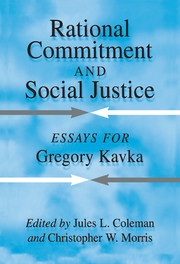Book contents
- Frontmatter
- Contents
- Acknowledgments
- List of Contributors
- Introduction: The Moral and Political Philosophy of Gregory Kavka
- Some Personal Memories
- The Shadow of the Future
- A New Paradox of Deterrence
- Rethinking the Toxin Puzzle
- Toxin, Temptation, and the Stability of Intention
- The Toxin Puzzle
- Religion and Morality in Hobbes
- Contemporary Uses of Hobbes's Political Philosophy
- The Knavish Humean
- Some Considerations in Favor of Contractualism
- Justice, Reasons, and Moral Standing
- Wrongful Life: Paradoxes in the Morality of Causing People to Exist
- Gregory S. Kavka's Writings
The Shadow of the Future
Published online by Cambridge University Press: 28 October 2009
- Frontmatter
- Contents
- Acknowledgments
- List of Contributors
- Introduction: The Moral and Political Philosophy of Gregory Kavka
- Some Personal Memories
- The Shadow of the Future
- A New Paradox of Deterrence
- Rethinking the Toxin Puzzle
- Toxin, Temptation, and the Stability of Intention
- The Toxin Puzzle
- Religion and Morality in Hobbes
- Contemporary Uses of Hobbes's Political Philosophy
- The Knavish Humean
- Some Considerations in Favor of Contractualism
- Justice, Reasons, and Moral Standing
- Wrongful Life: Paradoxes in the Morality of Causing People to Exist
- Gregory S. Kavka's Writings
Summary
The Foole
The Foole of Thomas Hobbes' Leviathan argues that reason does not require commitment,
seriously alleging, that every man's conservation and contentment, being committed to his own care, there could be no reason, why every man might not do what he thought conduced thereunto: and therefore also to make, or not make; keep or not keep Covenants, was not against Reason, when it conduced to one's benefit.
Hobbes is particularly interested in the possibility of viable agreements in the state of nature. For simplicity, consider an agreement between two people. Hobbes is addressing the question as to whether someone who has promised to do his part is required by reason, when the other member has already done her part at some cost, to do his part. The Foole thinks not. According to the Foole, honoring the agreement may be against reason if the required action is costly and the benefit of the other's act has already been gained. Hobbes disagrees: “But where either one of the parties has performed already; or where there is a Power to make him performe; there is a question whether it be against reason, that is, against the benefit of the other to perform, or not. And I say it is not against reason.”
The Foole analyzes the situation as an extensive form game: First A plays, then B. Each either performs his part of the agreement or not.
- Type
- Chapter
- Information
- Rational Commitment and Social JusticeEssays for Gregory Kavka, pp. 12 - 21Publisher: Cambridge University PressPrint publication year: 1998
- 8
- Cited by



